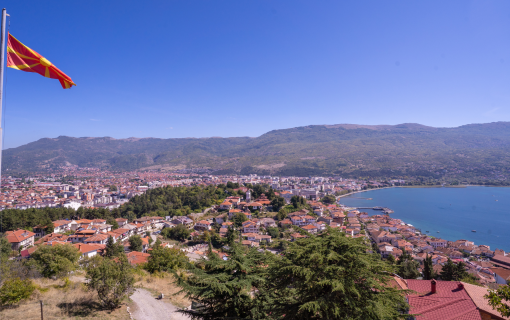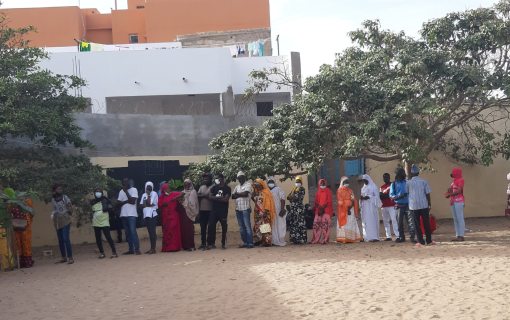Nigeria’s 2015 Elections: A Critical Vote for Democracy in Africa
By Bill Sweeney, President and CEO
On March 28, Nigerians went to the polls and voted decisively for change. Opposition candidate Muhammadu Buhari won approximately 52 percent of the vote to defeat incumbent President Goodluck Jonathon, who collected 44 percent. Across the country, the conduct of the vote took place in a civil atmosphere, largely undisturbed by violence. Goodluck Jonathon graciously conceded defeat and congratulated Buhari on his victory, a move which was welcomed by the heads of international observer missions. Although there were some reported problems, these elections were a positive harbinger for democracy in Nigeria and Africa at large.
As I have discussed elsewhere, the investments made in new technologies and processes and the many other preparations made by INEC provided Nigerian voters with confidence in the electoral process. In the 2011 presidential elections, there were riots and mayhem leading to approximately 800 deaths and 65,000 people displaced from their homes – and the 2011 elections were managed significantly better than the 2007 vote. Now, a week after the announcement of the results, Nigeria is on the path for a peaceful, democratic transfer of power. Indeed, Buhari is the first opposition candidate to win a presidential election in Nigeria, setting an important precedent for the country.
While the results of the vote reflected the will of Nigerians, there is never a perfect election and the 2015 general election in Nigeria was no exception. Nigeria’s Independent National Electoral Commission (INEC) made a major investment in biometric technology to improve voter identification and reduce allegations of voter fraud. The new Permanent Voter’s Card (PVC) and electronic card readers were introduced for the 2015 vote as part of this effort. There were a variety of issues with the card readers on Election Day. In some cases, biometric information could not be read, in other cases poll workers did not seem to understand how to use the machines. When incumbent President Goodluck Jonathon went to vote and it took nearly an hour for his fingerprint to be verified it ratcheted up media attention on the new technologies; it also took President-elect Buhari several minutes to have his fingerprint read.
With some polling stations not receiving all the required materials on time, some stations were not ready to open at 8 a.m. for accreditation and the accreditation process was extended well beyond the 1 p.m. deadline in certain cases. Some IFES Nigeria employees reported not having been verified until 5 p.m. INEC eventually decided to allow manual accreditation through the voter registration list when the card readers were not working properly. However, there were nearly 120,000 polling stations operating on Election Day, many of which did not have access to cell phone or internet service and were thus unable to receive INEC’s directive.
In some polling stations, voting became difficult as the sun set and INEC eventually made the decision to extend voting for an additional day. Despite the recent history of electoral violence in the country, Nigerians remained calm, with many optimistic voices expressing their hope that all votes would be counted in the days ahead.
The INEC’s smooth handling of this potential crisis demonstrates it burgeoning capacity as an independent and trustworthy institution. Since taking his post as Chairman of the INEC in late 2010, Professor Attahiru Jega has brought a new level of professionalism and integrity to the institution.
The introduction of the biometric register, while costly, was seen by many Nigerians as an important step in cutting down on the possibility of voter fraud and ballot stuffing. Since 2010, Chairman Jega has also pioneered internal reorganization of INEC's departments as well as new policies and procedures to improve efficiency and effectiveness of the bureaucracy. Despite the highly politicized environment surrounding INEC and elections in Nigeria, Chairman Jega has managed to maintain a reputation for being impartial and professional and is well respected by Nigerian civil society and citizens. As his term ends in June 2015, we should all celebrate his legacy.
As observers bemoan the worldwide “democracy recession,” Nigeria’s 2015 general elections are an important victory for democracy in Africa and around the world. Along with having Africa’s biggest economy, Nigeria is also the continent’s largest democracy, with one of the largest electorates in the world. Indeed, with over 68 million registered voters; a large contingent of internally displaced persons; and thousands of candidates squaring off for some 1,500 seats, the conduct of these elections were incredibly complex, making the outcome of the vote even more important. Adding to this complexity, Boko Haram’s continued public threats to disrupt the 2015 elections resulted in a six-week postponement. Since 2009, the terrorist group is responsible for over 13,000 dead, 1.5 million internally displaced people and many kidnappings, including the high profile kidnapping of 219 school girls. Nigerians’ votes were a rejection of Boko Haram and this terrorist legacy.
These elections were an important statement about the viability of democracy in countries experiencing transition or conflict. There are more elections scheduled in Africa in the next two years than on any other continent. Many of these votes will take place in countries in such environments. African voters will have a clear choice between the ballet and the bullet and there is reason, rooted in recent history, to be hopeful. As I noted in my March 18 testimony before the House Foreign Affairs Committee, with some of the recent democratic successes in Africa there is a “fledgling culture of trust emerging from the dust of terrible, violent conflict.” The 2015 general elections in Nigeria were a step in the right direction for democracy in Africa and sign of hope for those who fear a growing democracy deficit.









